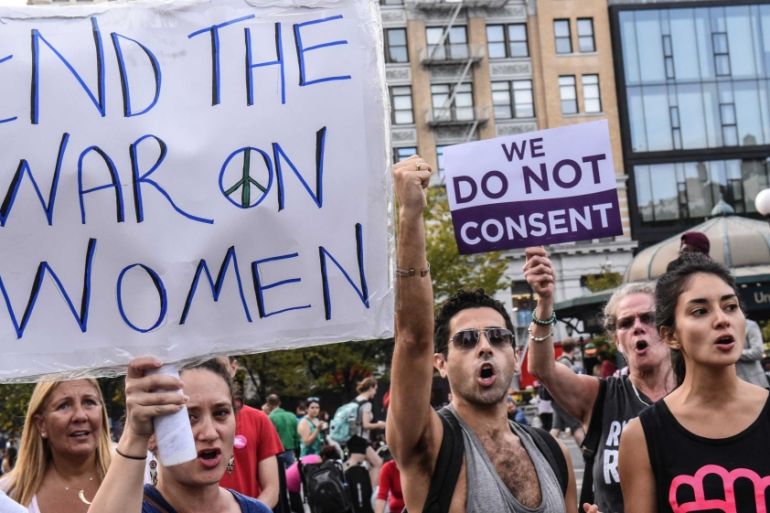Coronavirus may have ‘devastating’ effects on reproductive rights
New report highlights potential ‘unrecognised’ impacts of the pandemic, including an increase in maternal deaths.

New research paints a devastating picture of the potential effects the novel coronavirus could have on reproductive health around the world, describing a chain reaction of unmet needs, unintended pregnancies, unsafe abortions and tens of thousands of maternal and newborn deaths.
As countries scramble to contain the viral outbreak, the Guttmacher Institute, a US-based reproductive rights research organisation, studied what could happen if access to sexual and reproductive care drops by 10 percent over the course of a year. An additional 49 million women in 132 middle- and low-income countries would not access the contraceptives that they require, the report, published on Thursday found. It also estimated an additional 15 million unintended pregnancies would take place.
Keep reading
list of 3 itemsUS appeals court allows Texas coronavirus abortion restrictions
UN: Pandemic disrupts women’s access to reproductive services
Childbirth could also become more dangerous – 1.7 million women and 2.6 million newborns would suffer “major complications”, the researchers warned, leading to 28,000 more maternal deaths and 168,000 newborn deaths.
It also estimated an increase of three million unsafe abortions, and 1,000 maternal deaths from botched procedures.
“These numbers are devastating and reflect the potential suffering of millions of people around the world,” Zara Ahmed, the Guttmacher Institute’s associate director for federal issues, said in a statement. Researchers describe the 10 percent figure as a “conservative” estimate “meaning that the impact could be far greater.”
Regardless of the magnitude, vulnerable groups will bear the brunt. Those groups include, adolescents, people who identify as LGBT, refugees, imprisoned people, those in violent relationships, with disabilities or living in poverty.
There is already evidence of how the pandemic is affecting reproductive health. Contraceptive supply chains have been disrupted as manufacturers focus on COVID-19, leading to shortages of condoms. Abortion clinics have been forced to close because governments have not deemed them essential services during lockdowns. As countries throw everything they can at the pandemic, worries grow that it could come at the expense of other healthcare.

While health providers in India have convinced the government to relax some restrictions during a mandatory quarantine, and feminist groups in Argentina and Colombia have redoubled their outreach regarding access to legal abortion services, limits on movement are impeding the ability of many to get to facilities that do remain open. And fear over contracting the virus itself could be keeping women from seeking the care they need.
“Previous public health emergencies have shown that the impact of an epidemic on sexual and reproductive health often goes unrecognised, because the effects are often not the direct result of the infection, but instead the indirect consequences of strained healthcare systems, disruptions in care and redirected resources,” the authors of the Guttmacher report wrote.
“Now more than ever, it is critical that governments safeguard essential sexual and reproductive health services,” Guttmacher Institute senior research scientist Elizabeth Sully said in a statement.
The report uses evidence from the Ebola outbreak in Western Africa from 2013 to 2016 to illustrate what can happen to reproductive health during crises. Fear of seeking treatment during the epidemic and disrupted services contributed to 3,600 maternal and neonatal deaths, and stillbirths in Sierra Leone, the report stated, which is close to the number of deaths caused directly by the viral outbreak in the country. Studies found that Ebola outbreaks caused a decline in the use of contraception, and family planning visits in Guinea, Liberia and Sierra Leone.
‘An essential service’
The Guttmacher Institute called on governments to define sexual and reproductive healthcare as essential, to strengthen supply chains, ensure contraception is available without a prescription, adopt remote models of care, such as telehealth, and ensure resources are not diverted. The needs of the vulnerable must be addressed, it added. It also called on the US government to step up its funding of global programmes.
“By learning from prior epidemics, putting in place critical resources and systems, and promoting sexual and reproductive health and rights, we can prevent health system disruptions that have disastrous, lasting impacts on individuals, families and the global community,” said Ahmed.
Dr Alok Banerjee, technical adviser for Parivar Seva Sanstha, a reproductive health organisation in India, has already seen the effects of COVID-19 on access. The organisation had to close its 31 clinics that provide family planning and abortion services under the government imposed lockdown.

Public facilities have remained open, but with transit at a standstill, it’s virtually impossible for many women to get to the care that they need, Dr Banerjee told Al Jazeera. He said the government has decided to relax some restrictions, which means that 10 Parivar Seva Sanstha clinics are expected to open next week in areas that are not considered COVID-19 “hot zones”. The government has also enabled a better flow of contraceptives, he said, which are running low because imported raw materials weren’t being allowed in and manufacturers had shifted efforts to the pandemic.
“Definitely, there is a crisis in reproductive health, particularly those who are seeking abortion and those who are willing to continue the contraception, a replenishment is necessary, that is a concern to all of us,” he said in a telephone interview. “Across the world, this is a crisis period,” he said, one that he hoped would end soon.